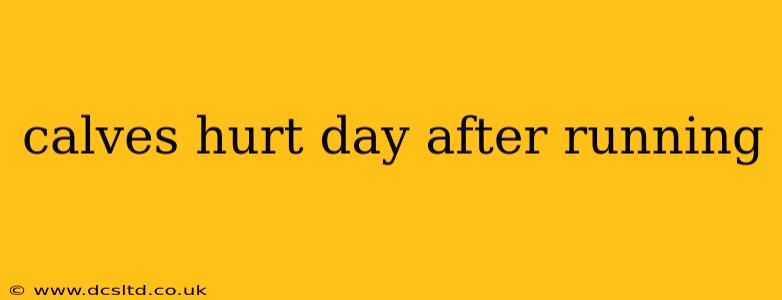Running is a fantastic way to improve cardiovascular health and overall fitness, but it can sometimes come with unwelcome side effects, like sore calves the day after a run. This post will delve into the common causes of calf pain post-run, effective treatment strategies, and preventative measures to keep you running strong.
Why Do My Calves Hurt After Running?
Post-run calf pain is a common complaint among runners, regardless of experience level. Several factors can contribute to this discomfort:
-
Overuse: This is the most frequent culprit. Running repeatedly puts stress on your calf muscles (gastrocnemius and soleus), leading to microscopic tears in muscle fibers. This microtrauma triggers inflammation and pain. Increasing your mileage too quickly or suddenly changing your running surface can significantly increase this risk.
-
Dehydration: When dehydrated, your muscles don't function optimally. This reduces their elasticity and increases the risk of strain and injury. Proper hydration is crucial for muscle recovery and performance.
-
Improper Form: Poor running technique, such as overstriding or landing heel-first, places excessive strain on your calves and other lower leg muscles.
-
Inadequate Warm-up and Cool-down: Failing to properly warm up before running leaves your muscles unprepared for the exertion, while skipping a cool-down prevents gradual muscle relaxation and increases the likelihood of soreness.
-
Tight Calf Muscles: If your calf muscles are already tight, running will exacerbate this tightness and potentially lead to pain.
-
Inadequate Footwear: Wearing worn-out or inappropriate running shoes that don't provide sufficient support can also contribute to calf pain. Shoes should be replaced regularly and chosen based on your foot type and running style.
-
Underlying Medical Conditions: In some cases, calf pain might be a symptom of a more serious underlying medical condition, such as plantar fasciitis, Achilles tendonitis, or even a stress fracture. If the pain is severe, persistent, or accompanied by other symptoms, consult a doctor.
What Can I Do to Treat Sore Calves After Running?
The good news is that most post-run calf pain is manageable. Here are some effective treatment strategies:
-
Rest: Allow your calves to rest and recover. Avoid strenuous activities that further stress the muscles.
-
Ice: Apply ice packs to your calves for 15-20 minutes at a time, several times a day. This helps reduce inflammation.
-
Compression: Wearing compression socks can help improve blood flow and reduce swelling.
-
Elevation: Elevate your legs whenever possible to reduce swelling.
-
Over-the-Counter Pain Relief: Ibuprofen or naproxen can help alleviate pain and inflammation. Always follow the recommended dosage.
-
Stretching: Gentle calf stretches can help improve flexibility and reduce muscle tightness. Focus on static stretches, holding each for 20-30 seconds. Examples include gastrocnemius and soleus stretches.
-
Foam Rolling: Using a foam roller on your calves can help release muscle tension and improve blood flow.
How Can I Prevent Calf Pain After Running?
Prevention is always better than cure. Here's how you can minimize the risk of calf soreness:
-
Gradual Progression: Increase your running mileage gradually, avoiding sudden increases that overload your muscles.
-
Proper Warm-up and Cool-down: Always include a proper warm-up before each run, incorporating dynamic stretches like leg swings and high knees. Finish with a cool-down that includes static stretches.
-
Hydration: Stay well-hydrated before, during, and after your runs.
-
Proper Running Form: Focus on maintaining good running form to minimize stress on your calves. Consider seeking advice from a running coach if needed.
-
Strengthening Exercises: Incorporate strengthening exercises, such as calf raises, to improve muscle strength and endurance.
-
Appropriate Footwear: Invest in good quality running shoes that provide adequate support and cushioning.
What if my calf pain is severe or persistent?
If your calf pain is severe, persistent, or accompanied by other symptoms like swelling, redness, or numbness, consult a doctor or physical therapist. They can help diagnose the underlying cause of your pain and recommend appropriate treatment.
How long does calf pain after running usually last?
The duration of calf pain after running varies depending on the severity of the muscle strain and individual recovery rates. Minor soreness usually subsides within 24-48 hours, while more significant pain may last for several days. If the pain persists beyond a week, consult a healthcare professional.
Are there any exercises to strengthen my calves to prevent future pain?
Yes, several exercises can strengthen your calf muscles. Calf raises (both single-leg and double-leg), seated calf raises, and jump squats are effective exercises that target the gastrocnemius and soleus muscles. Remember to start with a manageable number of repetitions and gradually increase the intensity and volume as your strength improves.
Remember, listening to your body is crucial. If you experience any significant pain, stop running and address the issue before it worsens. By following the tips outlined above, you can significantly reduce your risk of calf pain and enjoy your runs without discomfort.
